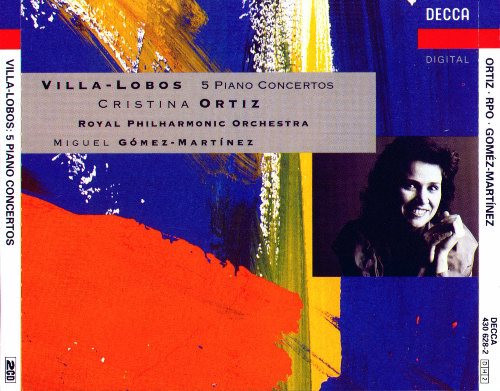Ho-Hum
Well... we can't have it all.
As I've mentioned before, listeners new to Brazilian composer Heitor Villa-Lobos should start with the Bachianas Brasileiras, Chôros, Forest of the Amazon, or maybe even the symphonic poems. Most will say the concertos and symphonies are his most problematic compositions.
Well, here we are. As a blanket statement, it sounds to my ears as if Villa-Lobos has composed the same concerto five times over. That is probably unfair, but this is what I feel in my viscera.
If I have a preference, it is probably for Concertos 4 & 5, although I like the finale of the Second Concerto a lot, and there are many snatches of this and that which deserve attention in all of the concertos. It should probably be said, you won't find anything exotic-sounding in any of the concertos either, where the percussion make very rare appearances throughout the set.
Some call these Piano Concertos Romantic, ala Rachmaninov. I can see certain aspects aligning with such statements, but I hear more Modernism than Romanticism, although neither is a great descriptor. In one way, every utterance in these concertos are epic musical statements, full of big, overstated gestures. The way Villa-Lobos orchestrates sounds like these could be a soundtrack to a 70s disaster film or gritty thriller, where even the slower lyrical portions offer a murder-mystery atmosphere. So in this sense, yes, one could call these Romantic.
Yet there is more dissonance and structural wandering than anything Rachmaninov would ever compose; I would use Darius Milhaud as my best comparison. I use the term dissonance, but Villa-Lobos' harmonies are more open than anything crunchy or close-knit. Quartals seem to figure greatly into the composer's harmonic landscape, not to mention endless octave runs, so perhaps angular and mid-Century would be more apt of a description.
Each of the concerto's 3rd movements contain a solo piano cadenza, so there is plenty of opportunity for the pianist to show off as well, either with orchestra or without. This aspect should give any piano lover plenty of delight, regardless of the music, for the technique required sounds insurmountable.
None of the Piano Concertos capture me though, at least as a whole. There are many moments where I am captivated, but Villa-Lobos often wanders off without revisiting what captures my attention. In this way, his style of composition is very stream of consciousness, where the composer may revisit a musical idea, yet might not by moving onto something different. It can be a frustrating listening experience, and not wholly satisfying.
What I cannot complain about is the Royal Philharmonic Orchestra under the direction of Miguel Gómez-Martínez, nor the playing from Brazilian pianist Cristina Ortiz, who is obviously a champion of Villa-Lobos. These are big, swollen, hard-hit performances, and in most cases, the only recordings of these concertos. Perhaps there isn't enough variety or vision to separate all five of these works in my mind, but there might not be much to add or subtract to make this happen either.
So, there is enough here to not throw away this recording, but not enough to want to revisit these but for every decade which passes. This is not a strong recommendation nor a strong discommendation, although I personally lean towards the latter.
Listen on YouTube
Works
Piano Concerto 1 (36.56)
Piano Concerto 2 (26.56)
Piano Concerto 3 (25.50)
Piano Concerto 4 (29.08)
Piano Concerto 5 (20.41)
Performers
Cristina Ortiz, piano
Royal Philharmonic Orchestra
Miguel Gómez-Martínez, conductor
Label: Decca
Year: 1989-90 /1992 / 1997
Total Timing: 2.19.25
New to Villa-Lobos? Start elsewhere.
Savored Villa-Lobos? Give them a try.
You certainly can't complain about these performances, but the music is generally considered difficult for listening.
Difficult structurally, I think, rather than anything from the composer's musical statements, although I suppose some of that is part-and-parcel of the whole.
Find more Villa-Lobos recordings HERE!



Comments
Post a Comment